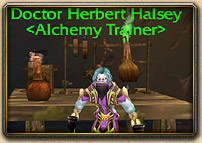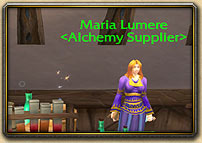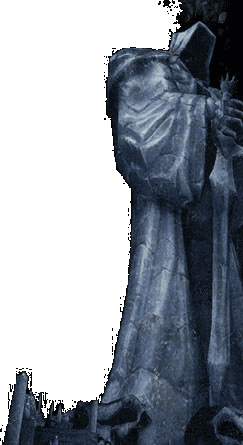|
|
|
|

 The Alchemist mixes herbs in order to generate potions with a variety of effects. A player can create healing,
invisibility, elemental resistance, and mana potions; oils to coat weapons; and much more.
The Alchemist mixes herbs in order to generate potions with a variety of effects. A player can create healing,
invisibility, elemental resistance, and mana potions; oils to coat weapons; and much more.
Alchemy is useful to all character classes. Melee fighters can use alchemy to create buff and healing
potions. Spell casting classes can use alchemy to create mana potions and related buffs.
Alchemy is a fun Profession where you can create potions for yourself, sell them to others, or give
them to your party members and friends. Alchemists are well loved when they hand out potions.
Looking for Profession Guides?
Click here.
|
 |

 First, you need to find an alchemy trainer. You can ask a guard in a big city to find a trainer if you're lost.
First, you need to find an alchemy trainer. You can ask a guard in a big city to find a trainer if you're lost.
You don't need any special equipment or devices beyond the required reagents. Alchemy always
requires flasks to make potions. There are four flasks: Empty, Leaded, Crystal, and Imbued.
You can make potions anywhere.
Master Alchemy
Master Alchemy (maximum skill 375) is learned from trainers in Outland:
- Horde players should seek out Apothecary Antonivich (Thrallmar, Hellfire Peninsula), Lauranna Thar'well (Cenarion Refuge, Zangarmarsh), Zarevhi (Stormspire, Netherstorm), or Lorokeem (Shattrath City).
- Alliance players need to find Alchemist Gribble (Honor Hold, Hellfire Peninsula), Lauranna Thar'well (Cenarion Refuge, Zangarmarsh), Zarevhi (Stormspire, Netherstorm), or Lorokeem (Shattrath City)
Outland: Raising your alchemy skill to 375
There are many ways to go about leveling your skill from 300 to 375 in terms of what you can make. Highlander from EU-Terenas recommends
progressing as follows: Volatile Healing Potion, Sneaking Potion, Super Healing Potion, then finally Major Dreamless Sleep Potion.
Grand Master Alchemy
Grand Master Alchemy (skill 375-450) is learned in Northrend.
- Alliance players find Lanolis Dewdrop at Valgarde, Howling Fjord.
- Horde players go to Wilhelmina Renel at Vengeance Landing, Howling Fjord.
- Both sides can visit Dalaran City and find Linzy Blackbolt at the Magus Commerce Exchange.
|
 |
 If you wish to be an Alchemist you should already be an Herbalist. It is possible to be an alchemist without
being an herbalist but is not recommended.
If you wish to be an Alchemist you should already be an Herbalist. It is possible to be an alchemist without
being an herbalist but is not recommended.
Potions are created from herbs. You will also need to buy various
reagents from the Profession merchants as well as find rare reagents from monsters, fishing, chests, or
other players.
|

|
 |
 The Alchemy trainer will teach you many recipes. Additional recipes will have to be found from monster drops, chests, or (more commonly) purchased from other players. You can unlock additional recipes with reputations.
Make sure you tell your friends you are an Alchemist and they may bring you recipes and reagents.
The Alchemy trainer will teach you many recipes. Additional recipes will have to be found from monster drops, chests, or (more commonly) purchased from other players. You can unlock additional recipes with reputations.
Make sure you tell your friends you are an Alchemist and they may bring you recipes and reagents.
|
|
 |
 You can sell potions to other players. Build a stack of potions then figure out a good
price for them. You may have to experiment with the prices until you reach the right price. Inform players about the benefits of your potions and why they should want to buy them. Some potions will be more popular than others. Everyone likes healing potions! Sell your
potions in the auction house.
You can sell potions to other players. Build a stack of potions then figure out a good
price for them. You may have to experiment with the prices until you reach the right price. Inform players about the benefits of your potions and why they should want to buy them. Some potions will be more popular than others. Everyone likes healing potions! Sell your
potions in the auction house.
|
|
 |
|
Sample Potions:
|

|
Greater Healing Potion - Restores X to Y health.
|
 |

|
Mana Potion - Restores X to Y mana.
|

|
Swim Speed Potion - Increase your swim speed significantly for X sec.
|

|
Elixir of Water Breathing - Allows the imbiber to breathe underwater for X min.
|

|
Elixir of Firepower - Increases spell fire damage by X for Y min.
|

|
Weak Troll's Blood Potion - Regenerate X health every Y seconds for Z min.
|
|
|
|
 |
Transmutes
Through the process of transmutation, alchemists can convert certain raw materials into other types of materials. These are most commonly
items used in tradeskills, such as essences and metals. Essences can be found as drops from elementals in Azeroth, such as the air and
earth elementals in Silithus and the fire elementals in Un'goro Crater. Alchemists can also transmute one type of precious metal, such as
gold, mithril, and truesilver, into one of the next higher quality. Transmutation requires a Philosopher's Stone, which is created by the
alchemist. Transmuting also carries a cooldown, which can range from 24 hours to 4 days, during which no other item can be transmuted
by the alchemist.
New in Outland are high-level materials for professions called primals. Similar to essences, primals come in elemental varieties such
as Primal Water, Fire, and Earth, as well as new varieties such as Mana and Might. Like essences, alchemists can transmute one variety
of primals to another, such as Primal Earth to Life. These various transmutes are learned from formulas that you can purchase from trainers,
obtain as reputation rewards, or find as drops from monsters.
Northrend replaces Primals with Eternals.
Specialization
At the highest skill levels, master alchemists can select a specialization in one of three areas: Transmuting, Potions, and Elixirs.
A specialist in one of these areas has a chance of creating additional finished products when practicing their craft. For example, a master of
potions has a chance of creating more than one potion for the same materials.
To become a specialist, you must be at least level 68 with at least 345 skill in alchemy. To become a master of potions, seek out Lauranna
Thar'well in Cenarion Refuge, Zangarmarsh. For the master of elixirs, go to Lorokeem in Shattrath City. Finally, Zarevhi, the trainer
of master transmutation, resides in Stormspire, Netherstorm.
You can unspecialize in alchemy and then select a new specialization. This is a repeatable choice, but costs gold each time.
Elixir Categories
Elixirs now stack in two categories, Battle (Offensive) and Guardian (Defensive) Elixirs. You can only have one of each type of Elixir up at a time.
As a result Elixirs now stack with class abilities such as Arcane Intellect.
Elixirs stack to 20.
Other Random Information
- New cauldron recipes can be discovered when making most major protection potions. Cauldrons can provide an entire raid with a major protection potion.
- Flasks are potions that can grant very powerful buffs that last through death and are very important for Raiding.
- Alchemists can create powerful resistance potions that are useful in dungeons and raids.
- Alchemists can transmute Arcanite and sell it or sell the use of the transmute to other players
- Alchemists can also transmute metals
- Alchemy buffs only sometimes stack with spell buffs.
|
|
 |
|
|
|

|
 Online Privacy Policy | Legal Documents | Policies
Online Privacy Policy | Legal Documents | Policies